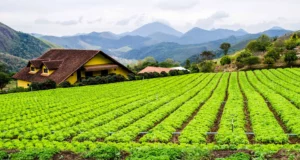In the last three years, Brazil has witnessed a dramatic rise in farmland prices, nearly doubling to R$ 55,000 (USD 11,000) per hectare by the end of 2023.
This spike reflects a worldwide increase in agricultural commodity prices and a significant expansion of farming areas within the country.
Even after adjusting for inflation, prices saw a substantial 59.9% increase.
Though there was a modest real appreciation of 3.2% from 2022 to 2023, there was a nominal decrease of 0.5%.
Looking ahead to 2024, prices are expected to stabilize, showing little to no major shifts.

The peak in agricultural commodity prices between 2022 and 2023 spurred producer investments, boosting land values.
However, a subsequent fall in these prices lowered farmer incomes, affecting their purchasing power for new lands.
This scenario led to regional price adjustments, as analyzed by Anderson Galvão from Céleres Consultoria.
Land appreciation varied: reforestation areas rose 118.3%, agricultural lands (grains/oilseeds) increased 91.5%, despite a nominal 2023 drop.
The highest land prices were recorded in the southern region, especially in Paraná, known for its quality soil.
Despite rising land prices, the market’s transaction pace slowed down, affected by falling commodity prices and their impact on agricultural profitability.
Agricultural Land as Inflation Hedge
Agricultural land serves as a hedge against inflation globally, attracting investors seeking protection. However, Brazil imposes strict regulations on foreign rural area investments.
Scot Consultoria noted a cooling in the land market despite a general increase in prices, suggesting a shift towards market stabilization.
BrasilAgro’s consistent land liquidity in 2023 suggests ongoing interest in land investment, despite the challenges faced by the agricultural sector.
After years of rapid price growth driven by low interest rates, pandemic-induced demand, and inflation, Brazil’s farmland market is poised for a phase of stabilization.
Yet, crop profitability, interest rates, and economic factors will continue to play a crucial role in shaping future trends.

